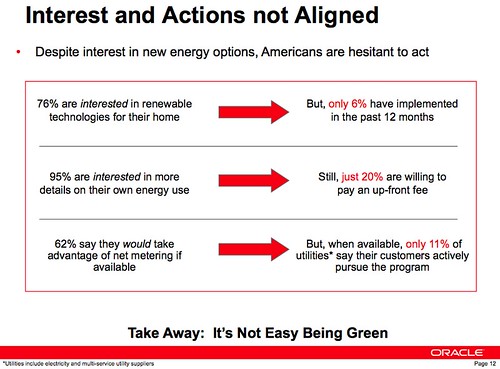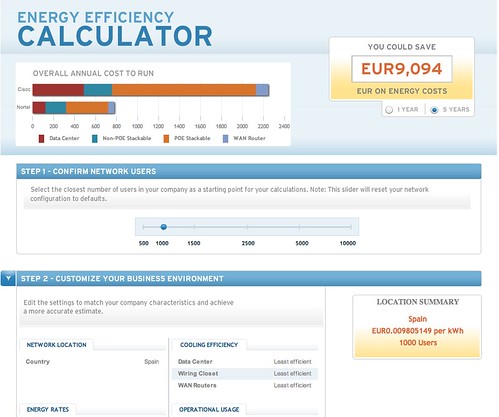
Oracle released the results of a research report last week called “Turning Information into Power“.
The report had some interesting findings – from the press release:
Americans are concerned about energy costs and show interest in new energy options.
- 94% are concerned with the energy costs of their primary residence.
- 95% are interested in receiving detailed information on their energy use.
- 76% are interested in renewable energy technologies for their home – and 72% of those respondents state that “reducing personal energy costs” is the most important benefit of renewable energy.
Other interesting findings include:
- When asked to give their utility suppliers a grade on their “current ability to provide detailed, useful information on energy consumption,” only 14% of Americans gave their utility an “A.” When grading themselves on the same question, only 16% of utility managers gave their organizations an “A.”
- While more than half (58%) of electricity and multi-service utilities surveyed currently offer net metering programs – which allow homeowners to generate their own renewable energy or sell it back to their utilities – just 11% of these utilities say their customers are actively pursuing the programs.
This clearly demonstrates a communications issue between the utilities and their customer base.
While on Smart Grids –
- 91% of utility managers believe it is critical that the U.S. adopts smart grid technologies.
- 41% of utilities have assessed the opportunity for smart grid technologies and
- Utility managers believe “upfront consumer expenses” (42%) and a “lack of consistent industry technology standards” (30%) will be the biggest roadblocks to maximizing benefits of the smart grid
There is a lot of interesting information to digest in this report – mainly though it is good news. The American people want more information on their energy use, they are interested in renewables and microgeneration. The renewables, for their part, believe that rolling out smart grids is critical, provide net-metering programs but don’t, as yet, provide detailed useful information on energy consumption in their bills.
Both sides perceive the biggest obstacle to the rollout of smart grids is financial.
Let’s hope that the $11bn pledged to the implementation of smart grids by the Obama stimulus plan will break down some of these barriers.
I hope to be interviewing Guerry Waters, vice president, industry strategy, Oracle Utilities about this report in the coming weeks, if you have any questions you’d like me to put to Guerry, please feel free to leave them in the comments.
Related articles by Zemanta
- Smart grid faces major hurdles (businessgreen.com)
- Power to the people (googleblog.blogspot.com)
- Making the Grid Work for Renewable Energy (sciam.com)
- Can the DOE stimulate the smart grid? (arstechnica.com)
- A $2 trillion bet on powering America (money.cnn.com)
- Green news harvest: Credit crisis slams wind, solar (news.cnet.com)


